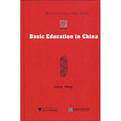中国基础教育
2009-9
浙江大学出版社
汪利兵 著
150
261000
In China, the term basic education is normally used to include pre-school education, primary education, and academic-oriented secondary education (vocational secondary education is excluded). Basic education is an important part of Chinas national education system which also embraces secondary vocational and technical education, higher education, and adult education. In 1986, China officially introduced a 9-year compulsory education system in the country, which covers 6-year primary education and 3-year junior secondary education. In this sense, pre-school education and senior secondary education are not part of the compulsory education system, although great efforts have been made on the part of the government to promote the coverage of pre-school education and senior secondary education during the past decade. The Legacy Before 1949 Efforts to establish a modern education system in China started in the late Qing Dynasty, the last feudal empire in China. In 1902, the then government of the Qing Dynasty issued Chinas first series of official documents on the establishment of a modern school system entitled Royal Charters on School System, which consisted of charters on the establishment of kindergartens, primary schools, secondary schools, and higher education institutions. In these documents, the objectives, duration of study, entrance requirements, subjects of study of different levels of education institutions, and their connections were envisaged. However, due to lack of confidence and political endorsement, these charters were not able to be implemented as they had been planned.
Basic Education in China provides a general overview of the development of basic education in China in the past decades. In China, the term "basic education" is normally used to include pre-school education, primary education, and academic-oriented secondary education (vocational secondary education is excluded). The book starts with a brief historical review on the development of basic education in China since the establishment of its modern school system. It then examines the recent development of policies and practices in the fields of pre-school education, admission arrangements at primary and secondary levels for both public and private schools, school curriculum, financing of basic education, examinations and assessments, teacher education, special education, and basic education for rural-urban migrant children in China. The analyses in the book are mainly based on national legislation, government regulations, and local follow-up activities. The book is intended for researchers, policy makers, and practitioners in the field of basic education.
Dr. Libing Wang is a professor at the Department of Education at Zhejiang University, China. He is also Director of UNESCO-APEID Associated Center at Zhejiang University. Dr. Wang is specialized in comparative education, education policies and teacher edu
Series Editors' PrefacePreface1 Pre-school Education 1.1 Responsibilities 1.2 Objectives and Guiding Principles 1.3 The Content of Pre-school Education 1.4 The Funding of Pre-school Education 1.5 The Operation of Kindergartens 1.6 Development of Pre-school Education in the New Century"2 School Admission Arrangements 2.1 School Catchment Area 2.2 Admission to Public Schools 2.3 Admission to Private Schools 2.4 Special Arrangements for Non-local Children 2.5 Admission to Senior Secondary Schools 2.6 Parental Choice3 School Curriculum 3.1 Three-level Management of School Curriculum 3.2 The Structure of Basic Education Curriculum 3.3 National Curriculum Criteria 3.4 The Development and Regulation of School Textbooks 3.5 The Relevance to the World of Life 3.6 School-based Curriculum Development 3.7 Comprehensive Practice Activities4 Financing of Basic Education 4.1 The Responsibility of the Central Government 4.2 The Responsibility of Local Governments 4.3 The Pay and Conditions of Teachers 4.4 School Operating Expenditure 4.5 School Capital Investment 4.6 Student Support System 4.7 Some Facts and Figures5 Examinations and Assessments 5.1 The Development of JSECEs 5.2 Recent Reforms of JSECEs: the Case in Zhejiang Province 5.3 The Development and Reforms of SSECEs 5.4 The Development of University Entrance Examinations 5.5 New University Entrance Examination System in Zhejiang Province 5.6 Student Assessment 5.7 Teacher and School Assessment6 Teacher Education 6.1 Pre-service Teacher Education 6.2 Reforms on Pre-service Education of Primary School Teachers 6.3 Qualified Teacher Status 6.4 Induction Training of New Teachers 6.5 Teachers Continuing Education 6.6 National Teacher Education Network 6.7 Capacity Building of Teachers in Education Technology 6.8 Free Teacher Education Project 6.9 Teacher Training for the Implementation of New Curriculum Reforms 6.10 Professional Master's Degree in Education7 Speeial Edueation 7.1 General Guidelines 7.2 Modalities of Schooling 7.3 Special Education Curriculum 7.4 Teacher Training 7.5 The Case in Zhejiang Province 7.6 Future Directions8 Basic Education of Rural-Urban Migrant Children'-" 8.1 Background 8.2 National Policies 8.3 Local Responses 8.4 Innovative Practice in Schools" 8.5 Future DirectionsReferencesIndex
Under the new system, the government is responsible for the determination of national curriculum criteria for each school subject; institutions and individuals are encouraged to develop school textbooks according to the national curriculum criteria, which leads to the diversification of school textbooks; schools and teachers are responsible for the implementation of school curriculum. In the circumstances, schools and teachers have more operational autonomy in the selection of textbooks and adoption of teaching modalities. Teachers no longer deliver their teaching strictly according to outside guidance, they can rather plan their teaching by themselves, although at the early stage they need capacity building with the assistance of outside experts. This also means that the ideas of teachers professional development and teachers as researchers are gradually accepted, and school-based action research by teachers become more popular in the transitional period to the new system. Another fundamental change has been the introduction of three dimensions of study target in the assessment of teaching quality. It has been proposed that teachers should plan each of their teaching session with the following three dimensions of study target.
